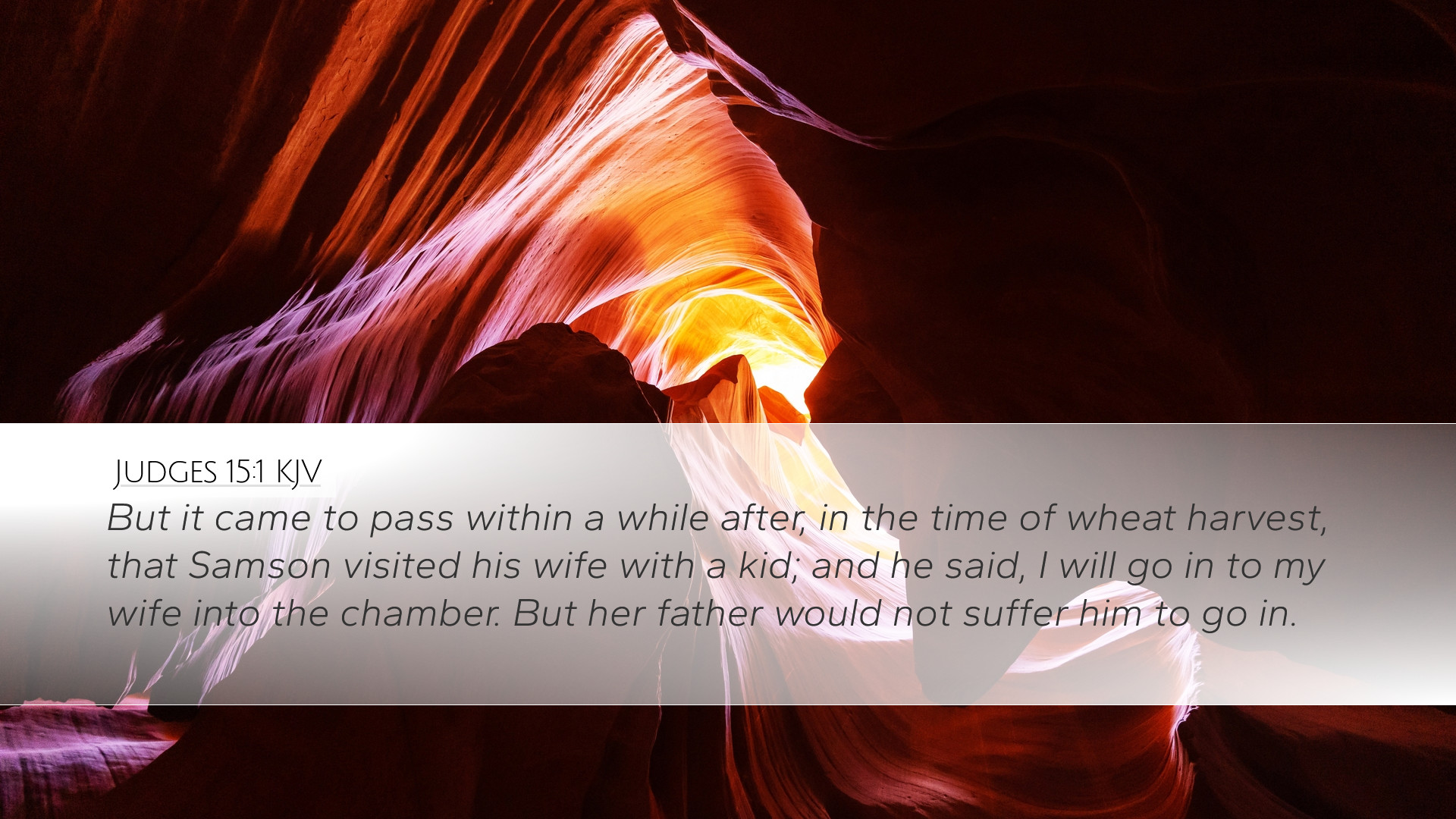Old Testament
Genesis Exodus Leviticus Numbers Deuteronomy Joshua Judges Ruth 1 Samuel 2 Samuel 1 Kings 2 Kings 1 Chronicles 2 Chronicles Ezra Nehemiah Esther Job Psalms Proverbs Ecclesiastes Song of Solomon Isaiah Jeremiah Lamentations Ezekiel Daniel Hosea Joel Amos Obadiah Jonah Micah Nahum Habakkuk Zephaniah Haggai Zechariah MalachiJudges 15:1
Judges 15:1 KJV
But it came to pass within a while after, in the time of wheat harvest, that Samson visited his wife with a kid; and he said, I will go in to my wife into the chamber. But her father would not suffer him to go in.
Judges 15:1 Bible Commentary
Commentary on Judges 15:1
Judges 15:1 states: "But it happened, within a while after, in the time of wheat harvest, that Samson visited his wife with a young goat. And he said, 'Let me go in to my wife, into her room.' But her father would not permit him to go in."
Contextual Background
In this verse, we encounter a significant moment in the life of Samson, a judge of Israel, known for his supernatural strength. The period of the Judges was marked by cycles of sin, oppression, and deliverance, which necessitated the emergence of leaders endowed with divine strength to rescue the Israelites. Samson's earlier marriage to the Philistine woman highlights the tensions between Israel and the Philistines, an ongoing theme in the book of Judges.
Insights from Commentaries
Matthew Henry
Matthew Henry emphasizes the profound implications of Samson's visit to his wife, perceiving it as both a personal and social engagement. He notes that the timing, “in the time of wheat harvest,” adds a significant agricultural context, symbolizing abundance and the beginning of joy in life. Henry also underscores the notion of reconciliation with his wife following a tumultuous engagement, indicating that Samson yearns for familial ties amidst hostility.
Albert Barnes
Albert Barnes offers a detailed analysis of the socio-cultural implications of this visit. He suggests that bringing a young goat is a traditional gesture of goodwill, intended to mend relationships and appease his father-in-law. Barnes highlights the refusal of the father, “her father would not permit him to go in,” as an insight into ongoing familial tensions and the consequences of the prior conflict between Samson and the Philistines. This act represents not merely personal rejection but also the larger collective enmity between the Israelites and the Philistine oppressors, showcasing how personal relationships are entangled with national identity.
Adam Clarke
Adam Clarke expands upon the emotional aspects surrounding this encounter, pointing out that Samson’s return signifies his need for human connection, particularly in a time of turmoil. He notes the significance of “a young goat” as a means of restoration, emphasizing that symbolic gestures are crucial in establishing peace. Clarke also mentions that Samson's choice to visit at the wheat harvest season indicates a period of hope, yet highlights the irony of rejection he faces instead of reconciliation. Such rejection exacerbates the conflict, foreshadowing future events that lead to escalated violence with the Philistines.
Theological Implications
The engagements in Judges 15:1 serve to illuminate key theological themes such as:
- Divine Sovereignty: Samson’s story illustrates how God’s plans often circumvent human decisions and relationships.
- Human Relationships: The entangled relationships reveal how personal strife can reflect larger social and communal tensions.
- Representational Leadership: As a judge, Samson’s actions symbolize Israel’s larger struggle against oppression and the need for deliverance.
Pastoral Reflections
For pastors and leaders, Judges 15:1 invites a reflection on conflict resolution and reconciliation in their own ministries. The importance of communication and the need to approach conflicts with gestures of goodwill can be profoundly instructive. Just as Samson attempted to offer peace to his wife, church leaders may find that building bridges within their congregations requires intentional acts of kindness. Moreover, the stark reminder of external pressures and conflicts posed by the Philistines serves as a reminder that pastoral care often occurs within a context of broader societal struggles.
Concluding Thoughts
Judges 15:1, while presenting a personal narrative, encapsulates broader themes prevalent in the book of Judges—identity, conflict, and divine intervention. Through the insights gained from Henry, Barnes, and Clarke, we realize that the complexities of Samson's life are reflective of the struggles faced by the people of Israel. This verse encourages an examination of both personal and communal relationships within the scope of spiritual leadership and divine purpose.


